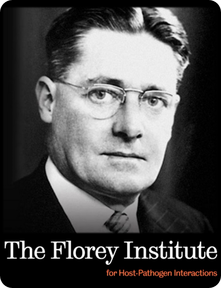Florey Institute research fellow Dr Rebecca Corrigan has been awarded the prestigious Lister Fellowship from the Lister Institute of Preventative Medicine (http://www.lister-institute.org.uk/). This award will fund Dr Corrigan's research on the human pathogen Staphylococcus aureus (also known as MRSA) for the next five years.
Infections caused by Staphylococcus aureus/MRSA can be severe and life threatening requiring the use of antibiotics. Some bacteria are able to survive these treatments by switching into a non-growing less active state called persistence. Dr Corrigan’s research will focus on how bacteria switch into this persistent state to understand antibiotic tolerance and bacterial growth during infections.
Infections caused by Staphylococcus aureus/MRSA can be severe and life threatening requiring the use of antibiotics. Some bacteria are able to survive these treatments by switching into a non-growing less active state called persistence. Dr Corrigan’s research will focus on how bacteria switch into this persistent state to understand antibiotic tolerance and bacterial growth during infections.
On receiving the award, Dr Corrigan said:
‘In my laboratory we work on how bacteria deal with stressful environments, such as low nutrient availability or antibiotic treatment. The bacterial stringent response is the biological mechanism used by all bacteria to cope with these types of cell stresses. When exposed to unfavourable ‘stressful’ conditions bacteria respond by synthesising a compound called (p)ppGpp in their cells. Once synthesised (p)ppGpp is responsible for controlling a series of cellular switches leading to a downregulation of pathways involved in active growth and a population shift into a more persistent state.
It has been shown that synthesising (p)ppGpp is vital for controlling the transition of bacteria into inactive growth states and is involved in antibiotic tolerance. Very little is known about how (p)ppGpp functions in infectious S. aureus bacteria on a molecular level, however we do know that the ability to switch on this response is important in long-term S. aureus infections.’
‘In my laboratory we work on how bacteria deal with stressful environments, such as low nutrient availability or antibiotic treatment. The bacterial stringent response is the biological mechanism used by all bacteria to cope with these types of cell stresses. When exposed to unfavourable ‘stressful’ conditions bacteria respond by synthesising a compound called (p)ppGpp in their cells. Once synthesised (p)ppGpp is responsible for controlling a series of cellular switches leading to a downregulation of pathways involved in active growth and a population shift into a more persistent state.
It has been shown that synthesising (p)ppGpp is vital for controlling the transition of bacteria into inactive growth states and is involved in antibiotic tolerance. Very little is known about how (p)ppGpp functions in infectious S. aureus bacteria on a molecular level, however we do know that the ability to switch on this response is important in long-term S. aureus infections.’
What will this prize do for your research?
‘My lab has identified new ways cells can respond to (p)ppGpp and this award will allow us to translate these findings into Zebrafish model infection systems to treat disease.’


